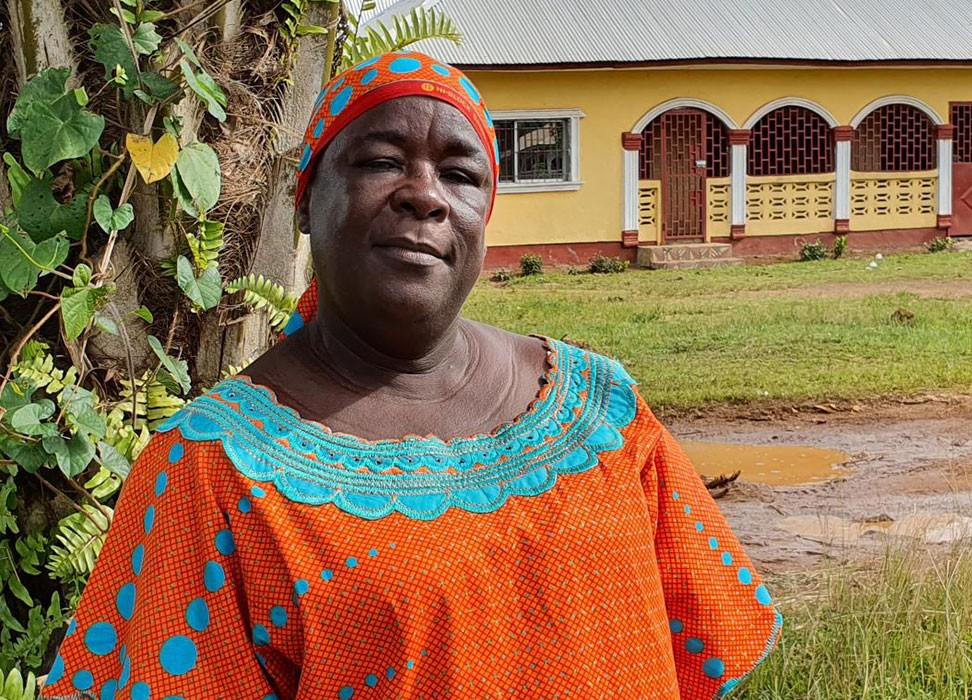Following a moratorium on FGM in Liberia, victims are still seeking justice
09 June 2022

“I was so happy to get my daughter back,” Deborah Parker said.
On 28 September 2021, Parker’s 15-year-old daughter was abducted by traditional leaders in Liberia, known as the zoes, and taken from Mount Barclay, a town near the capital Monrovia, to the Sande Bush. There, she was forcibly initiated into the zoes’ secret society. For these women, initiation includes female genital mutilation (FGM).
From the moment her daughter was abducted, Parker spoke up, going against an unwritten community rule that such harmful practices remained unspoken. She went to the police, knocked on the doors of governmental offices, and contacted several NGOS, international organizations and UN presences in Liberia, including UN Human Rights, for help.
On 10 November, Parker had grown impatient of the wait and decided, with help from a local NGO, to retrieve her daughter. She had found out that her daughter and 42 other girls had been moved from the Sande Bush to another town. Parker went to the girls’ new location and paid for her daughter’s release.
Parker’s campaign to denounce the zoes and harmful practices in Liberia did not end when she got her daughter back. Today, she continues to tell the stories of her daughter’s and other families’ ordeals to the press and anyone else who will listen. She even went to the National Council of Chiefs and Elders of Liberia to demand an end to the practice of kidnapping people for forceful initiation into secret societies. Such practice, she stressed, is not a part of Liberian culture.
Following Parker’s request for assistance from UN Human Right’s country office in Liberia, on 10 February 2022, several Special Procedures mandate holders of the Human Rights Council issued a communication about her case to the Government. In that communication, they expressed their concern over several violations to her daughter’s rights, including her rights to life; physical integrity; liberty; not to be subjected to torture or other cruel, inhuman, or degrading treatment or punishment,
In 2018, then Liberian President Ellen Johnson-Sirleaf signed an executive order to ban FGM for girls under 18. This was followed by another one-year ban imposed in 2019 by traditional leaders who signed the Ganta Declaration, a seven Count Policy Statement for the temporary suspension of zoes activities. When Parker’s daughter was forcibly taken, legal protections against FGM were no longer enforced. However, Parker’s campaign is likely to have prompted the Government and the National Council of Chiefs and Elders of Liberia to announce a three-year moratorium on FGM on 21 February 2022.
Uchenna Emelonye, Country Representative for UN Human Rights in Liberia, welcomed the development.
“The desired end result would be the promulgation of a law that penalises and abolishes [FGM] in Liberia,” he said. “[This] requires for the Parliament to be involved, thus also requiring the citizenry to be involved on that request for the President to sign it into law.”
Emelonye pointed out that Parker had become a strong voice against FGM. She was herself initiated into the Sande Bush secret society, yet is now one of the few Liberian women who, despite societal pressure to keep quiet, has been able to speak up on the issue.
“Her voice has re-echoed and reverberated in so many corners of Liberia and internationally on the impact and effects of FGM,” Emelonye said. “It is thanks to her that the issue of FGM can be put on the table and discussed and possibly abolished.”
UN Women’s Country Representative to Liberia, Comfort Lamptey, said that she foresees and end to FGM in Liberia. It will take time, but the foundations are already being laid, she added.
“We need to see more women who have gone through this practice speak out and attest to its harmful effects,” she said. “So long as we can ensure that there are alternative livelihoods for many women who engage in these practises, so long as we also invest in more education of communities around the harmful effects of FGM, and so long as we can also bring those who defy the ban to face the rigours of the law, I believe that we can see an end to FGM overtime.”
Victims still seeking redress
When Parker’s daughter was taken to the Sande Bush, she was told by the zoes that she had to pay them money and bring food and other supplies every day otherwise her daughter would not be fed. The secret society also demanded USD 45 for her daughter’s release. To this day, Parker has not received her money back nor compensation for the wrongs done to her daughter.
Now released, Parker’s daughter is no longer enrolled in school. Because of all the money she gave to the zoes, Parker can no longer afford to pay her daughter’s school fees.
“On the one hand I received justice because my daughter came back. On the other hand, I did not get justice because the women who abducted her were not prosecuted,” Parker said. “Although the [authorities] said they would make them compensate me, I am still fighting for these women to be arrested and pay back my expenses. I lost the little money I had.”
Parker remains vigilant, “for the children that are still in the community, whose lives are under threat because of the Sande,” she said.
A three-year moratorium on FGM is not enough for Parker. She is calling for the Government of Liberia to do more to ensure that girls can go to school without fear of getting kidnapped by the zoes.
“The advice I can give to parents who are going through the same ordeal as I did is to continue the fight. Those of us who can speak up should speak up for those who cannot,” she said. “No one should give up until changes come.”



